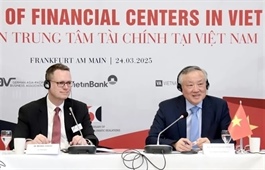SBV ready to support private sector
SBV ready to support private sector
The SBV consistently directs credit institutions to expand effective lending, improve credit accessibility for businesses and reduce operating costs to lower lending rates.

Workers at a food factory in the southern province of Đồng Tháp. — VNA/VNS Photo |
Through various policy mechanisms, particularly in credit provision with reasonable interest rates, banks have supported businesses in expanding operations and enhancing competitiveness, said Deputy Governor of the State Bank of Vietnam (SBV) Đào Minh Tú during a seminar in Hà Nội yesterday.
The SBV has implemented multiple measures to ease access to bank credit, especially for small and medium-sized enterprises (SMEs) in the private sector.
As of late 2024, total outstanding loans to private enterprises reached approximately VNĐ6.91 quadrillion (US$270 billion), marking a 14.72 per cent increase from 2023 and accounting for 44 per cent of the economy’s total credit balance. Credit to SMEs stood at VNĐ2.75 quadrillion, growing 10.7 per cent year-on-year.
Currently, the private sector contributes nearly 50 per cent of GDP, provides around 30 per cent of state budget revenue, and employs 85 per cent of the workforce.
"This demonstrates that bank credit has met the capital needs of private enterprises in a timely manner, fostering economic growth and enhancing state revenues," Tú said.
The SBV consistently directs credit institutions to expand effective lending, improve credit accessibility for businesses and reduce operating costs to lower lending rates.
Interest rates have declined significantly, with the average lending rate in 2024 dropping by 1.24 percentage points. The downward trend is expected to continue through 2025, further easing financial burdens on businesses and individuals.
Beyond financial support, banks are also facilitating access to new technologies, production expansion and enhanced global competitiveness. These initiatives have become a key catalyst for private sector growth, generating long-term economic value.
Recognising private sector development as a strategic, long-term national policy, the banking sector has proactively introduced comprehensive solutions to facilitate credit expansion. These include flexible exchange rate management to mitigate external shocks, coordinated monetary policy tools to manage exchange rate pressures, proactive interest rate policies to ensure banks have access to low-cost capital from the SBV, and encouraging cost reductions and digital transformation to bring down lending rates further.
Despite strong credit growth, Tú said private enterprises still face considerable challenges, particularly due to their small scale. Only 2 per cent of private firms are large enterprises, while the vast majority remain SMEs or micro-enterprises. This structural limitation affects financial resilience and competitiveness, making access to capital more difficult.
Nguyễn Văn Thân, chairman of the Vietnam Association of Small and Medium Enterprises (VINASME), emphasised the disproportionate focus on large corporate lending.
"Private enterprises are present in every economic sector, yet many still struggle with capital constraints. While banks have supported SMEs extensively, high outstanding loan balances indicate both strong demand and ongoing challenges in accessing funds," Thân said.
For SMEs, building financial credibility is essential to gaining banks’ confidence. Thân suggested closer collaboration between SMEs and financial institutions, with business associations acting as intermediaries to streamline loan access.
"Digitalisation and financial technology are key to improving lending efficiency and reducing barriers for smaller businesses," he said.
The private sector remains a vital engine of Việt Nam's economy, contributing nearly 50 per cent of GDP, over 30 per cent of state revenues, and generating more than 40 million jobs.
- 09:48 26/03/2025
























